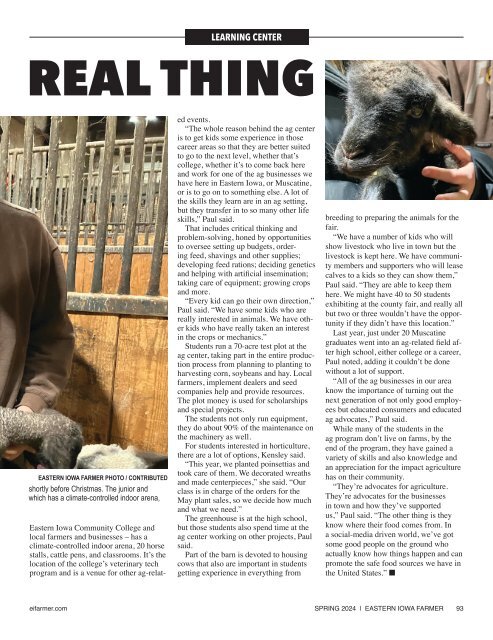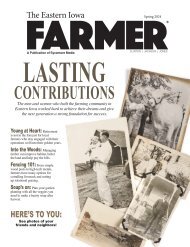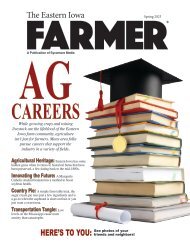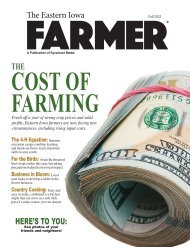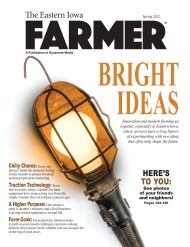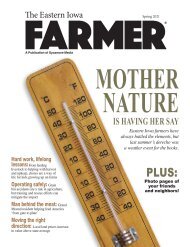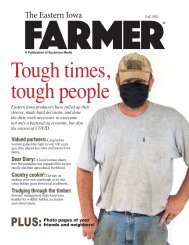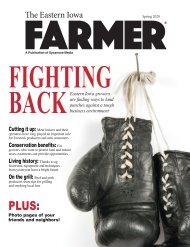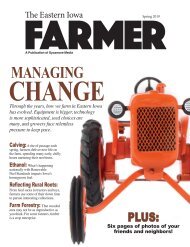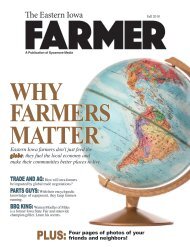You also want an ePaper? Increase the reach of your titles
YUMPU automatically turns print PDFs into web optimized ePapers that Google loves.
LEARNING CENTER<br />
REAL THING<br />
EASTERN IOWA FARMER PHOTO / CONTRIBUTED<br />
shortly before Christmas. The junior and<br />
which has a climate-controlled indoor arena,<br />
Eastern Iowa Community College and<br />
local farmers and businesses – has a<br />
climate-controlled indoor arena, 20 horse<br />
stalls, cattle pens, and classrooms. It’s the<br />
location of the college’s veterinary tech<br />
program and is a venue for other ag-related<br />
events.<br />
“The whole reason behind the ag center<br />
is to get kids some experience in those<br />
career areas so that they are better suited<br />
to go to the next level, whether that’s<br />
college, whether it’s to come back here<br />
and work for one of the ag businesses we<br />
have here in Eastern Iowa, or Muscatine,<br />
or is to go on to something else. A lot of<br />
the skills they learn are in an ag setting,<br />
but they transfer in to so many other life<br />
skills,” Paul said.<br />
That includes critical thinking and<br />
problem-solving, honed by opportunities<br />
to oversee setting up budgets, ordering<br />
feed, shavings and other supplies;<br />
developing feed rations; deciding genetics<br />
and helping with artificial insemination;<br />
taking care of equipment; growing crops<br />
and more.<br />
“Every kid can go their own direction,”<br />
Paul said. “<strong>We</strong> have some kids who are<br />
really interested in animals. <strong>We</strong> have other<br />
kids who have really taken an interest<br />
in the crops or mechanics.”<br />
Students run a 70-acre test plot at the<br />
ag center, taking part in the entire production<br />
process from planning to planting to<br />
harvesting corn, soybeans and hay. Local<br />
farmers, implement dealers and seed<br />
companies help and provide resources.<br />
The plot money is used for scholarships<br />
and special projects.<br />
The students not only run equipment,<br />
they do about 90% of the maintenance on<br />
the machinery as well.<br />
For students interested in horticulture,<br />
there are a lot of options, Kensley said.<br />
“This year, we planted poinsettias and<br />
took care of them. <strong>We</strong> decorated wreaths<br />
and made centerpieces,” she said. “Our<br />
class is in charge of the orders for the<br />
May plant sales, so we decide how much<br />
and what we need.”<br />
The greenhouse is at the high school,<br />
but those students also spend time at the<br />
ag center working on other projects, Paul<br />
said.<br />
Part of the barn is devoted to housing<br />
cows that also are important in students<br />
getting experience in everything from<br />
breeding to preparing the animals for the<br />
fair.<br />
“<strong>We</strong> have a number of kids who will<br />
show livestock who live in town but the<br />
livestock is kept here. <strong>We</strong> have community<br />
members and supporters who will lease<br />
calves to a kids so they can show them,”<br />
Paul said. “They are able to keep them<br />
here. <strong>We</strong> might have 40 to 50 students<br />
exhibiting at the county fair, and really all<br />
but two or three wouldn’t have the opportunity<br />
if they didn’t have this location.”<br />
Last year, just under 20 Muscatine<br />
graduates went into an ag-related field after<br />
high school, either college or a career,<br />
Paul noted, adding it couldn’t be done<br />
without a lot of support.<br />
“All of the ag businesses in our area<br />
know the importance of turning out the<br />
next generation of not only good employees<br />
but educated consumers and educated<br />
ag advocates,” Paul said.<br />
While many of the students in the<br />
ag program don’t live on farms, by the<br />
end of the program, they have gained a<br />
variety of skills and also knowledge and<br />
an appreciation for the impact agriculture<br />
has on their community.<br />
“They’re advocates for agriculture.<br />
They’re advocates for the businesses<br />
in town and how they’ve supported<br />
us,” Paul said. “The other thing is they<br />
know where their food comes from. In<br />
a social-media driven world, we’ve got<br />
some good people on the ground who<br />
actually know how things happen and can<br />
promote the safe food sources we have in<br />
the United States.” n<br />
eifarmer.com SPRING 2024 | EASTERN IOWA FARMER 93


